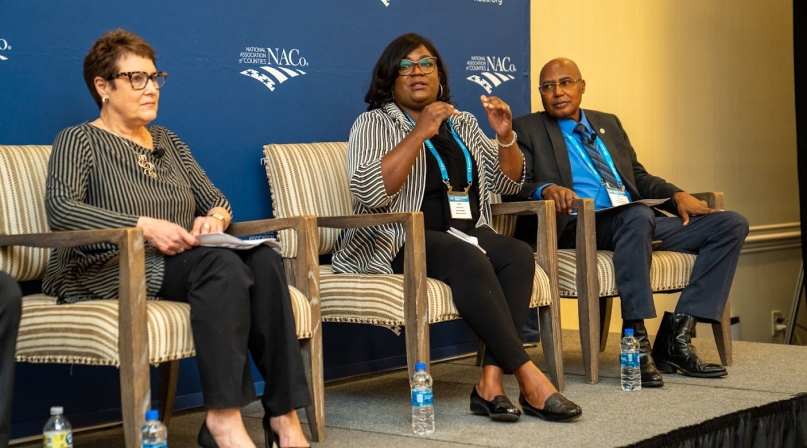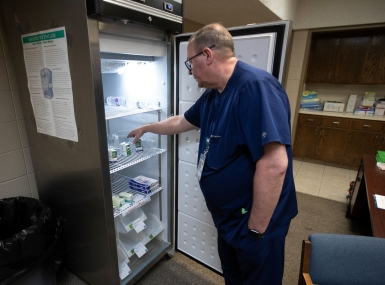Counties emphasize equity throughout COVID-19 and after

Key Takeaways
As counties continue to manage their pandemic relief resources, a frightening thought emerges.
Someday, this may all be a memory, committed to the history books when life returns to normal and the last funding from the American Rescue Plan Act has been spent.
If that’s scary to county officials, just think about what it means to the people for whom the federal aid has been a lifeline.
“Where will you be when the cameras are gone? Where will you be when the federal dollars dry up?” asked Nannette Bowler, Wake County, N.C.’s Health and Human Services director.
If the focus on equity in combating the effects of the pandemic is to be more than a flash in the pan, Bowler said during an April 8 panel on health equity, counties must pursue structural change to redesign systems around making sure the people who need services most are properly identified, targeted and reached.
In Wake County, that will take the form of population health director and community outreach program director positions.
“They will stay involved with the relationships in the community that we’ve built, including with our faith-based community,” she said.
“We [also] have our service delivery and the important part of that is to take the services where they are needed, create your regional networks and also making sure that technology isn’t an inhibitor. We have to look at making sure that we’re creating cultural and logistical messaging and looking at what our barriers are — transportation, technology, distrust.”
“We’re looking at prioritizing funding for our smaller organizations that don’t usually get the funding that they need in these marginalized communities,”
Bowler said. “We’re also looking at providing capacity to help build those organizations.”
It’s not as difficult as it would seem. Joanne Pierce, general manager of Durham County, N.C.’s Health and Well-being for All, said data is inescapable and a good start.
“You see data all of the time and you see who’s having the best outcomes, who’s having the worst,” she said. That’s a good place to start addressing inequity.
“I just internally, just started having conversations with people looking at our data, examining that data, not just public health, but social services, EMS, to all the different areas. We’re like third cousins — we’re related, but we don’t talk to each other very much. We just started looking at that and so the case was very easy, because it didn’t just share our data — we examined our data and used a different narrative than maybe we potentially have used in the past.”
Pierce approached equity in a racial context, pointing out that antiquated county policies may still be in effect even as the world around has changed, pointing to Durham County’s addition of a racial equity officer and two equity physicians among its staff. Institutional inertia can be a culprit.
“When it’s unchecked and when we haven’t looked at history and overlaid policies that they created, we have ‘race neutral’ policies that actually impact people by race and ethnicity,” she said.
“Inequities live and breathe and operate in our policies and our practices and in our procedures,” Pierce said. “It’s already kind of baked into our system.”
As county officials examine the systems and policies that guide their government, there also comes a time when things stop making sense.
For Martin County, N.C. Commissioner Ronnie Smith, that happened after a phone call from a constituent whose water had been turned off, despite having made a payment that morning.
Smith’s call to the water department was met with the recitation of a policy that the next day’s service would be based on accounts settled the day before. That didn’t seem right to Smith.
“We change policy every day,” he said during an April 8 discussion on health equity.
“Every leader, every community every county, every city government, you should take those policies out every so often and say, ‘I don’t need that,’ and rewrite and use the ones that are up to date. Most of them are outdated, most of them were written years ago.”
Pierce sees momentum in the movement to bring more equity to county government decision-making.
“If we look at our budget and we see it especially during COVID, much of the funds were used to address inequity and disparity and it actually made the conversation around equity more prominent because people are like, ‘Oh my goodness, people need shelter, people need this and that and then folks who didn’t have any health insurance or coverage,’ so we saw in plain view for the world to see that there was something in this.”
“So, making the case is that there certainly is a human face and then there’s a financial case, because equity is actually infusion of equitable tax systems that actually allows us to use our resources differently.”
In short, sometimes fairness can win.
Attachments
Related News

Measles outbreak underscores rural healthcare challenges
Texas and New Mexico counties are working to boost vaccination rates in response to the recent measles outbreak, which has included deaths in both states.

Mecklenburg County, N.C. adopts new pharmacy benefits program for employee healthcare
New program from National Association of Counties (NACo) and Public Promise Insurance (PPI) will reduce prescription coverage expenditures by 28 percent in 2025.

Federal cuts to Medicaid: What counties should know
Medicaid is a joint federal, state and local program that provides health coverage to low-income individuals, including children, pregnant women, elderly adults and people with disabilities. The program accounts for over half of all federal funding to states and is the largest source of federal funding in state budgets.
